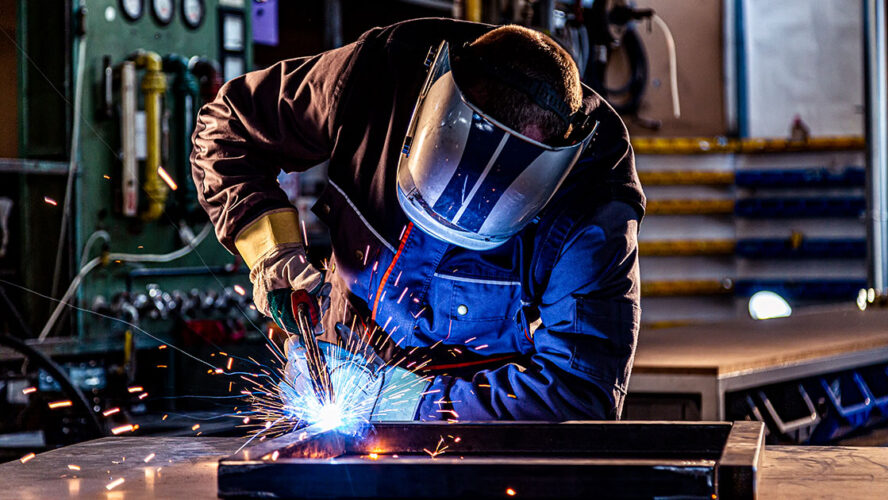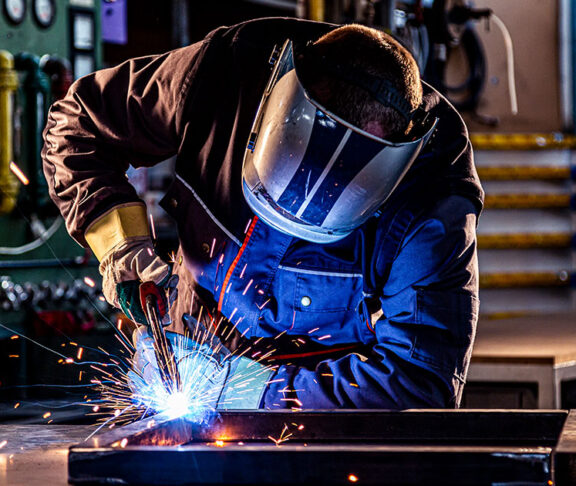Skilled trade careers are cool again, and welding offers some of today’s hottest career opportunities. Young people are attracted by the financial independence.
“Becoming a welder, I was able to move out on my own when I was 19 years old and afford my own car and car insurance,” says Jason Hammer, who was then a welding apprentice and now a welder. “Getting right to work after vocational school, I was in no debt.”
When it comes to finding employment, people who like to work with their hands have plenty of opportunities. America needs to fill 80,000 welding jobs annually, according to Welding Workforce Data, a website managed by the American Welding Society, a nonprofit organization with a mission to advance the science, technology, and application of welding and allied joining and cutting processes worldwide, including brazing, soldering, and thermal spraying.
“Over the last five years, we have a newfound respect for skilled tradespeople who keep the lights on, gas flowing, and make products in America,” says Joe Young, associate director, AWS Foundation. “A career in welding can take you as far as your dreams go and as hard as you want to work. Many company presidents and owners started on the shop floor.”
Young has his own amazing welding career, which propelled him from the classroom to the global stage during the 2009 WorldSkills Competition — the Olympics of skilled trades — as silver medalist on Team USA. He earned his AWS Certified Welding Inspector (CWI) and Certified Welding Educator (CWE) credentials, has taught welding courses at the college level, and now he’s helping drive the future of the industry as an AWS Foundation staff member.
Explore your future
Working in welding is more than just arcs and sparks behind a welding helmet. Sure, it may start with hands-on skills, but it also includes all the other roles inside a fabrication or manufacturing facility, including quality control, logistics, accounting, CAD-CAM design, robot operator, automation technician, and more. To educate people about career pathways and enjoy fun challenges like virtual welding, the Careers in Welding Mobile Experience is touring the nation this summer, making stops at State Fairs in Ohio, Wisconsin, Minnesota, and Iowa; a PBR rodeo in Nashville; the FABTECH trade show in Chicago; and more.
Learn faster
Welding education can start as early as high school, and program completion can be measured in weeks and months, providing the potential to start earning income quickly. Technical and community colleges also provide welding instruction, including many that offer two-year associate’s degrees. Both can culminate in students becoming AWS Certified Welders.
The Certified Welder program tests welders on procedures used in the structural steel, petroleum pipelines, sheet metal, and chemical refinery welding industries. The credentials distinguish job applicants because they can only be earned by passing skills-based testing. Such programs also appeal to veterans looking for a new career, especially those who accept the GI Bill.
Earn faster
Welding education is also attractive because it offers “earn while you learn” opportunities. High school co-op programs enable students to work at a local fabrication shop part-time while going to school. Registered apprenticeships are four-year programs where an apprentice works, for example, four days a week on the job and attends a technical school on the fifth day or at night. By law, apprentices earn a specific percentage of a journeyman’s wage, and many times the business will pay for their schooling.
Apprentices learn on the job, guided by experienced journeyman welders, and they may or may not be part of a union such as the ironworkers, boilermakers, sheet metal workers, plumbers and pipe fitters, or HVAC unions.
“For companies that want to take workforce development into their own hands, AWS offers a free framework for implementing and managing U.S. Department of Labor-approved Registered Welding Apprenticeship Programs,” says Young. “We have programs for AWS Certified Welder and Welding Inspector, and a third, Welding Automation, is currently in development.”
Scholarships available
Many welders choose to start their career at a technical college because it focuses on career-oriented skills and hands-on learning. Those who love math, metallurgy, and the science of welding — but who don’t want to sit behind a desk all day — often continue with four-year degrees like welding engineering. To enable students to focus more on their studies and worry less about tuition, the AWS Foundation has awarded over 12,000 welding scholarships totaling more than $15 million since 1993.
“The scholarship significantly helped me during the second year of my welding engineering program at Ferris State University,” said Cody Sype, a student at Ferris State University. Last summer, Sype had an internship with Newport News Shipbuilding and enjoyed being part of the shipbuilding process that protects our troops.
If you are the type of person who wants to point to a ship, a truck, or a tractor and take pride in saying, “I built that,” welding is a good career choice for you. Visit aws.org to learn more and find the Careers in Welding Mobile Experience tour schedule.

